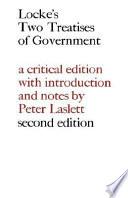 | John Locke - Liberty - 1967 - 548 pages
...motion, as not to bun themselves. . .as Hedges are set, not to however it may be mistaken, the end of Law is not to abolish or restrain, but to preserve...created beings capable of Laws, where there is no Law, then it no 20 Freedom. For Liherty is to be free from restraint and violence from others which cannot... | |
 | David Wootton - Political Science - 1996 - 964 pages
...confinement which hedges us in only from bogs and precipices. So that, however it may be mistaken, the end ity or remoteness. 5. Its fecundity. 6. Its purity....extends; or (in other words) who are affected by it. 5. no law: but freedom is not, as we are told, "a liberty for every man to do what he lists:" (for who... | |
 | Charles Larmore - Philosophy - 1996 - 244 pages
...and law with burden. Against such an equation stands, for example, Locke's insistence that "the end of law is not to abolish or restrain, but to preserve and enlarge freedom . . . where there is no law, there is no freedom."- Our preceding reflections, introductory though... | |
 | Lisa T. Sarasohn - History - 1996 - 258 pages
...laws of the state, nevertheless they are "certain and free," and likewise Locke argued that "the end of law is not to abolish or restrain, but to preserve and enlarge Freedom."104 Both Gassendi and Locke see the holding of property as the most crucial element in the... | |
 | Joshua Mitchell - Biography & Autobiography - 1993 - 276 pages
...society. See, for example, Locke, Second Treatise, Ch. VI, §57, p. 306: "the end of \the\ Law [o/Reason] is not to abolish or restrain, but to preserve and enlarge Freedom" (emphasis in original). Adam's reason is the basis of human freedom. quent claim that Christianity... | |
 | Alfonso de Julios Campuzano - Historical jurisprudence - 1997 - 344 pages
...G., Historia de la teoría política, p. 388. 15 "...the end of law is not to abolish or restraint, but to preserve and enlarge freedom: for in all the...states of created beings capable of laws, ' where there in no law, there is no freedom' ." (Locke, J.. Op. cit., p. 370). cede el paso a la fuerza o se mantiene... | |
 | Peter J. Katzenstein, Takashi Shiraishi - History - 1997 - 418 pages
...Patón (New York: Harper Torchbooks, 1954), p. 114. Locke wrote, "However it may be mistaken, the end of law is not to abolish or restrain but to preserve and enlarge freedom; for in all the the transnational level, the voluntary subjection of Asian nations to Japanese leadership. It can be... | |
 | David Walsh - Philosophy - 1997 - 408 pages
...would of it self vanish." There is no conflict between law and liberty in this sense, for "the end of law is not to abolish or restrain, but to preserve and enlarge freedom." Locke knew, of course, that law will not always be experienced so benignly or positively. There will... | |
 | Philip Pettit - Political Science - 1997 - 322 pages
...deserves the Name of Confinement which serves to hedge us in only from Bogs and Precipices . . . the end of Law is not to abolish or restrain, but to preserve and enlarge Freedom' (Locke 1965: 348).5 Richard Price (1991: 27) is particularly forthright on the theme of law — or,... | |
 | Duncan Ivison - Philosophy - 1997 - 258 pages
...Limitation as the direction of a free and intelligent Agent to his proper Interest," and thus its end is "not to abolish or restrain, but to preserve and enlarge Freedom. "I7 By definition, then, liberty is not simply that domain where the laws remain silent. Nor does this... | |
| |